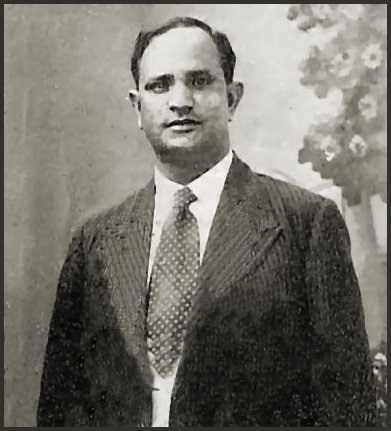Whatever happened to Mister Ulavi?

Late one Saturday afternoon in mid-September 1947, our precious "free-time" was shattered by the sound of sustained gunfire, which seemed alarmingly close by and coming from down below, on the south-west side of the hill. Within moments, the entire BD, (what was left of us) were up on the square pushing, shoving and elbowing for the best vantage point on the parapet wall. However, nothing could be seen down the khud-side or on the road below. We learned shortly afterwards however, that Mr. Ulavi's 'convoy' of Muslim employees and their families, that had left the hilltop less than an hour before had been ambushed just beyond the sharp bend below Peter Buck's on the Sonwara spur.
Later that same evening, a group of about 10 Sikhs shouldering an assortment of firearms appeared from around the corner at the kitchen end of Block 11, and strode brazenly and calmly across the quad, evidently on their way back home to Gharkal. The following day, Mr. Ulavi's car, (a drop-head limousine of the 1940's) was found abandoned on the road-side near Sonwara. Reportedly the windscreen was completely shattered, and the hood was in shreds.
For the rest of that year, all sorts of dreadful 'yarns' concerning the fate of Ulavi and his Muslim brethren were swapped around the evening "pine-bob" fires. Different versions abounded, each one more macabre and blood-curdling than the one before. The fact is however, we never really learned what actually happened down the khud-side that day. If any of the Staff knew anything more, they never told us. Stories of killings, massacres and atrocities on both sides were rife in those dreadfully troubled times. So, many of us left school in December that year fearing the worst for Mr. Ulavi, believing that something terrible had befallen him, his family and all the other school Muslims that left the hilltop on that fateful day.
Here now, some sixty-five years later, following a chance visit to this website, is the true story, verbatim:
"My full name is Abdul Haq Alvi, and I am the eldest son of Amir Ahmed
Alvi, known at that time as Ulavi. I am not a Sanawarian like you but
having lived there for 18 years, I do have nostalgia about Sanawar. We
were happy there and were forced to leave. I did not have any pics of
Sanawar but you have filled the void. God bless you!
First, hats off to your immaculate memory! My father was known as Ulavi
at that time, and it is amazing that you mentioned it on the bakery
picture. You are again correct regarding the driver--yes his name was
Mohd. Zubair.
Gurkha troops came to evacuate us from Sanawar. (13th September 1947
- ed.) Small children and womenfolk were loaded into army
trucks and men were told to march to Kalka via Gharkhal-Kasauli. Father
couldn't walk that far, and he decided to take a car along with the army
convoy. The car was fired upon after passing Gharkhal
(actually the sharp bend in the road below Peter Buck's -
ed.) and was abandoned there on the road. My father, mother,
two sisters, driver Zubair and a bakery employee Sardar - (he was very
popular with the students and they used to call him "Brown Sahib"), were
loaded into the trucks and reached Kalka safely. I along with three
younger brothers and our bakery employees walked to Kalka and were taken
to a make-shift refugee camp. Father, Zubair and Sardar were there but
not mother and sisters. We were told that they were taken to the railway
station and sent to Lahore. Those were, indeed, troubled times and we
were fortunate that no harm came to us in the camp and later, on the
train to Lahore. Sardar Mohinder Singh, a Sikh employee of LRMS bade us
farewell when we were leaving. His house was right opposite the Indian
Boys School. We got our primary education in this school.
I was a 3rd year student of Govt College in Lahore and at age 18,
returned home to Sanawar for the summer break. Julian Fernandes
(son of master H. ("Fundoo") Fernandes - ed.) was also there
and needed company for his trips to garrison cinema Kasauli to watch
movies. So he asked my father if he could take me and my younger
brother, Waheed with him to the cinema. Permission was given and we used
to walk on and off, to Kasauli with him to watch English movies.
Things, however, deteriorated rapidly after August 14 and it was no
longer safe to venture out side Sanawar. In fact, as you would have
recollected, we used to sleep in your barracks at night. (Ground
floor Junior dorms, (Block 12), after it had been vacated by the
remnants of Outram and Havelock in July/August - ed.)
After about a month or so in the camp (at Kalka) we were herded into a
train and sent to Lahore. We arrived safely, thanks to the military
special train following us carrying Baluch regiment troops. My uncle was
already settled in Lahore and my mother and sisters were there with him.
So we were spared the agony of searching for them in refugee camps in
and around Lahore. After remaining with his brother for some time in
Lahore, my father moved to Okara, a small town about 80 miles from
Lahore and settled there. He ran a small business there and died in
1969.
I will post more details of my family in my next E mail. Tell me when
you left Sanawar and what have you been doing all these years? Have you
visited India/ Pakistan after passing out from LRMS? Be my guest and
come to Lahore".
(LRMS Sanawar 1942-1947)
April 2011.